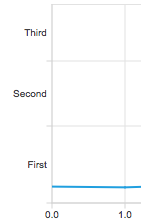QCategoryAxis Class
The QCategoryAxis class places named ranges on the axis. More...
| Header: | #include <QCategoryAxis> |
| Instantiated By: | CategoryAxis |
| Inherits: | QValueAxis |
Public Types
| enum | AxisLabelsPosition { AxisLabelsPositionCenter, AxisLabelsPositionOnValue } |
Properties
- categoriesLabels : const QStringList
- count : const int
- labelsPosition : AxisLabelsPosition
- startValue : qreal
- 5 properties inherited from QValueAxis
- 27 properties inherited from QAbstractAxis
- 1 property inherited from QObject
Public Functions
| QCategoryAxis(QObject *parent = Q_NULLPTR) | |
| ~QCategoryAxis() | |
| void | append(const QString &categoryLabel, qreal categoryEndValue) |
| QStringList | categoriesLabels() |
| int | count() const |
| qreal | endValue(const QString &categoryLabel) const |
| QCategoryAxis::AxisLabelsPosition | labelsPosition() const |
| void | remove(const QString &categoryLabel) |
| void | replaceLabel(const QString &oldLabel, const QString &newLabel) |
| void | setLabelsPosition(QCategoryAxis::AxisLabelsPosition position) |
| void | setStartValue(qreal min) |
| qreal | startValue(const QString &categoryLabel = QString()) const |
Reimplemented Public Functions
| virtual AxisType | type() const |
- 12 public functions inherited from QValueAxis
- 58 public functions inherited from QAbstractAxis
- 31 public functions inherited from QObject
Signals
| void | categoriesChanged() |
| void | labelsPositionChanged(QCategoryAxis::AxisLabelsPosition position) |
- 6 signals inherited from QValueAxis
- 25 signals inherited from QAbstractAxis
- 2 signals inherited from QObject
Additional Inherited Members
- 1 public slot inherited from QValueAxis
- 1 public slot inherited from QObject
- 11 static public members inherited from QObject
- 9 protected functions inherited from QObject
Detailed Description
The QCategoryAxis class places named ranges on the axis.
This class can be used to explain the underlying data by adding labeled categories. Unlike QBarCategoryAxis, QCategoryAxis allows the widths of the category ranges to be specified freely.
Example code on how to use QCategoryAxis:

QChartView *chartView = new QChartView; QLineSeries *series = new QLineSeries; // ... chartView->chart()->addSeries(series); QCategoryAxis *axisY = new QCategoryAxis; axisY->setMin(0); axisY->setMax(52); axisY->setStartValue(15); axisY->append("First", 20); axisY->append("Second", 37); axisY->append("Third", 52); chartView->chart()->setAxisY(axisY, series);
Member Type Documentation
enum QCategoryAxis::AxisLabelsPosition
This enum describes the position of the category labels.
| Constant | Value | Description |
|---|---|---|
QCategoryAxis::AxisLabelsPositionCenter | 0x0 | Labels are centered to category. |
QCategoryAxis::AxisLabelsPositionOnValue | 0x1 | Labels are positioned to the high end limit of the category. |
Property Documentation
categoriesLabels : const QStringList
This property holds the category labels as a string list.
Access functions:
| QStringList | categoriesLabels() |
count : const int
This property holds the number of categories.
Access functions:
| int | count() const |
labelsPosition : AxisLabelsPosition
This property holds the position of the category labels. The labels in the beginning and in the end of the axes may overlap other axes' labels when positioned on value.
Access functions:
| QCategoryAxis::AxisLabelsPosition | labelsPosition() const |
| void | setLabelsPosition(QCategoryAxis::AxisLabelsPosition position) |
Notifier signal:
| void | labelsPositionChanged(QCategoryAxis::AxisLabelsPosition position) |
startValue : qreal
This property holds the low end of the first category on the axis.
Access functions:
| qreal | startValue(const QString &categoryLabel = QString()) const |
| void | setStartValue(qreal min) |
Member Function Documentation
QCategoryAxis::QCategoryAxis(QObject *parent = Q_NULLPTR)
Constructs an axis object that is a child of parent.
QCategoryAxis::~QCategoryAxis()
Destroys the object.
void QCategoryAxis::append(const QString &categoryLabel, qreal categoryEndValue)
Appends a new category to the axis with the label categoryLabel. A category label has to be unique. categoryEndValue specifies the high end limit of the category. It has to be greater than the high end limit of the previous category. Otherwise the method returns without adding a new category.
[signal] void QCategoryAxis::categoriesChanged()
This signal is emitted when the categories of the axis change.
QStringList QCategoryAxis::categoriesLabels()
Returns the list of the categories' labels.
Note: Getter function for property categoriesLabels.
int QCategoryAxis::count() const
Returns the number of categories.
Note: Getter function for property count.
qreal QCategoryAxis::endValue(const QString &categoryLabel) const
Returns the high end limit of the category specified by categoryLabel.
void QCategoryAxis::remove(const QString &categoryLabel)
Removes a category specified by the label categoryLabel from the axis.
void QCategoryAxis::replaceLabel(const QString &oldLabel, const QString &newLabel)
Replaces an existing category label specified by oldLabel with newLabel. If the old label does not exist, the method returns without making any changes.
void QCategoryAxis::setStartValue(qreal min)
Sets min to be the low end limit of the first category on the axis. If categories have already been added to the axis, the passed value must be less than the high end value of the already defined first category range. Otherwise nothing is done.
Note: Setter function for property startValue.
See also startValue().
qreal QCategoryAxis::startValue(const QString &categoryLabel = QString()) const
Returns the low end limit of the category specified by categoryLabel.
Note: Getter function for property startValue.
See also setStartValue().
[virtual] AxisType QCategoryAxis::type() const
Reimplemented from QAbstractAxis::type().
Returns the type of the axis.
© 2017 The Qt Company Ltd. Documentation contributions included herein are the copyrights of their respective owners. The documentation provided herein is licensed under the terms of the GNU Free Documentation License version 1.3 as published by the Free Software Foundation. Qt and respective logos are trademarks of The Qt Company Ltd. in Finland and/or other countries worldwide. All other trademarks are property of their respective owners.
